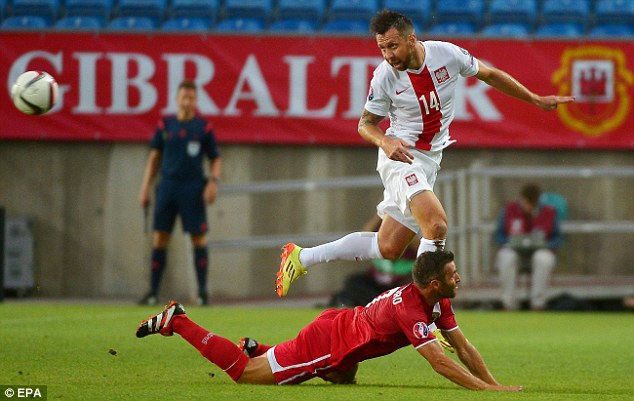
Gibraltar takes its place on the world soccer map
The British territory plays its first senior competitive match in Portugal’s Algarve Stadium
Eighty kilometers across the Spanish border stands the Estádio Algarve in Faro, built for Euro 2004 in Portugal. It was here on Sunday that Gibraltar fulfilled one of its soccer dreams: playing its first ever senior competitive match: a Euro 2016 qualifier against Poland. It lost the game 0-7, but was down only 0-1 at half time after acquitting itself well. It then collapsed in the second half with Bayern Munich striker Robert Lewandowski scoring four.
Something of a tepid debut, then, which was played out to an empty stadium (just 1,620 in a 30,000-capacity arena) where you could hear the shouts of the players and the thud of the ball being struck. But it was one that filled the authorities and inhabitants of Gibraltar with pride. “It is an historic day for us,” said Gibraltar fan Dylan Cocland in Andalusian-accented Spanish. “I’ve come here with my 11-year-old son, who will be able to see Gibraltar play official matches. Politics have prevented it from happening until now, but I’m not going to go into that. I can only say that I am very happy that they have recognized us.”
Spain hasn’t treated us well. Playing in an Andalusian city would be a win-win”
Cocland is one of 1,200 of the territory’s 29,000 inhabitants who made the 400-kilometer trip to Faro. Along with them were 300 very noisy Polish fans. “I would have liked to see them play in La Línea [the Spanish town that sits on the border with Gibraltar] but politics did not allow it,” added his friend Joseph Pérez. “Spain hasn’t treated us well. Playing in La Línea or in another Andalusian city would be a win-win for everyone. This attitude of Spain makes us feel rejected. We are British because of the strength it gives us to be so and Gibraltarian to preserve our identity.”
Playing in Faro costs the Gibraltar soccer federation €300,000 a game. A gigantic shirt with the Gibraltar badge occupied one corner of the stadium, which the territory’s government had filled with institutional promotion. Sixty media organizations – including those from Gibraltar, Poland, Spain and Britain – were accredited to cover the historic game. “It is a shame that politics and sport get mixed together,” said Julian Fortuna, a journalist at Gibfootballtalk. “I have friends playing down there and this is very big for us.”
Civil servants, firemen, policemen and the odd professional soccer player made up the team, many of whom were facing the biggest challenge of their careers. The professionals are Brits with distant relatives on the Rock, which gives them the right to play for the team. The rest are Gibraltar inhabitants who make up one of the eight teams from the territory’s league, whose matches are played in the Victoria Stadium. It is the fact that this venue does not meet Uefa requirements to host international games that led to the exodus. Spain will not consent to Gibraltar playing games on home soil after Uefa admitted the territory as a full member in 2013. So while it builds a new stadium it needs to find another home. It tried to play in La Línea and Cádiz, but Spain opposed, which is why it signed an agreement with Faro and found lodging there. It will thus play the rest of its Euro 2016 Group D qualifying games in Portugal: against Georgia, the Republic of Ireland, Scotland and current world champions Germany.









